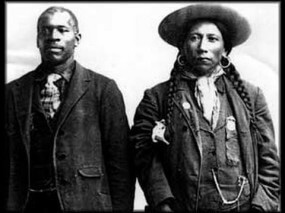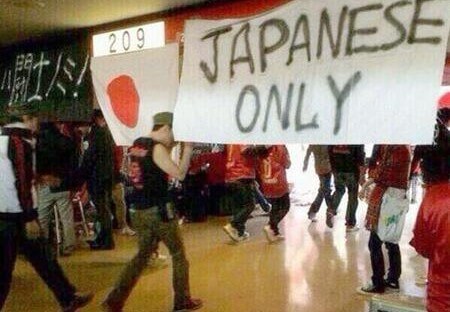TAKUAN AMARU
When a college-buddy of mine in the U.S. asked me this question, he was astonished to hear me say: “I don’t really face any racism in Japan…this is why I choose to live here.”
“Really?” my friend, Bill, responded with more than a hint of disbelief. “The reason I ask is that I have friends that lived in Japan and/or work for Japanese companies and they complain about how racist and unforgiving the Japanese are. They say no matter how long they live there or how well they speak the language they still are made to feel like outsiders.”
“Oh, no doubt about it,” I replied in a matter of fact tone, “Japanese definitely go out of their way to make non-Japanese feel like outsiders; your friends are right on point, that’s true.” Seeing Bill’s clueless expression, I knew it was necessary to explain the difference between discrimination and racism.
DISCRIMINATION IS FUNDAMENTAL
Over the years, I’ve heard numerous Europeans throw a fit about how Japanese rudely stare, or refuse to sit near them on subway cars. While these patterns may not demonstrate polite manners, do they constitute racism? Now, if the staring was followed by some rocks, racist expletives, or a gob of phlegm being hurled in their direction—and this was a normal occurrence; or if they were not allowed to sit on the subway (like during Jim Crow in the U.S.) this would surely qualify. But things like this never occur. As the beneficiaries of ‘white privilege,’ many of these complainants have been programmed to believe it’s all about them; so they fail to understand that the discriminating behavior of Japanese is happening all the time—even when they’re not around. In fact it never ends. The truth is: for any Japanese who dares to step outside of the status-quo, they may find themselves trapped in the cross-hairs of the social phenomenon known as ‘ijime.’
Although Japanese-English dictionaries translate ijime as bullying, perhaps ‘picking on someone’ might be a more natural expression.  Not agreeing with a popular idea, not being the ‘correct’ height or weight, having a unique hair style or the texture of your hair not being quite ‘right,’ any of these can easily send you into societal-purgatory. Prevalent in all walks of Japanese life, ijime is based solely on surface-level discriminating factors. Why even being too intelligent, pretty, or skillful—attributes or talents deemed positive—may still spell disaster.
Not agreeing with a popular idea, not being the ‘correct’ height or weight, having a unique hair style or the texture of your hair not being quite ‘right,’ any of these can easily send you into societal-purgatory. Prevalent in all walks of Japanese life, ijime is based solely on surface-level discriminating factors. Why even being too intelligent, pretty, or skillful—attributes or talents deemed positive—may still spell disaster.
In her article entitled, Bullying in Japanese Schools, Kirsty Kawano describes ijime as an “entrenched problem” of Japanese society before citing a study by the Tokyo Metropolitan School Personnel in Service Training Center. Of the more than 9,000 children surveyed in 2013, 66.2% had been the victim of some form of bullying. Perhaps even more stunning was the fact that 46.9%—nearly half—had experience being both perpetrator and victim.
If the Japanese do this to themselves, should an outsider expect anything different?
Don’t get it twisted: I am not claiming that discrimination in any form is okay; but before any conversation about racism takes place a distinction between the two needs to be established. A foremost authority on the topic, Dr. Frances Cress Welsing, defined racism as a power system and dynamic which consists of patterns of perception, logic, thought, speech, and emotional response. If this were the entire definition, I would agree that simply ‘otherizing’ certain groups of people—which is a form of ijime—might qualify as racism. However, Dr. Welsing also states this conscious or subconscious determination is occurring simultaneously in ALL areas of what she calls “People Activity.” The people activities consist of economics, education, entertainment, labor, law, politics, religion, sex, and war. A cursory glance at the daily life in the U.S. for Blacks, Mexicans, Filipinos, Latinos (any melanin-rich ethnicity) reveals systemic controls in all of these areas.
What about Japan? Do Japanese have a racist policy which specifically targets and attacks non-Japanese?
For Koreans, Brazilians, Filipinos, Ainu, Ryukyuans, the so-called ‘half-castes’ and Burakumin, there has been a long history of institutionalized bias against them. But what about now? Is it still going on?  I decided to ask a lady who not only descends from the Ainu but is also well-versed on the topic. “The Burakumin are actually descendants of the Native Emishi…” Hotene wrote. The Emishi tribes lived in what is now northeastern Honshu of the Tohoku region. Known in contemporary sources as Michi no Oku (道の奥), literally translated “in the road”, the Emishi are said to be related to Ainu.
I decided to ask a lady who not only descends from the Ainu but is also well-versed on the topic. “The Burakumin are actually descendants of the Native Emishi…” Hotene wrote. The Emishi tribes lived in what is now northeastern Honshu of the Tohoku region. Known in contemporary sources as Michi no Oku (道の奥), literally translated “in the road”, the Emishi are said to be related to Ainu.
When asked to compare the lives of Burakumin or Ainu to the disenfranchised groups in the U.S., Hotene responded thus:
“Japan was founded on laws and tradition that were meant to conquer indigenous people…I will not say who has it more shitty. BUT the fact is, in America, if you have one drop of African (blood), you were considered Black under Jim Crow. This is
because they had value in the physical body of the slave. In Japan, and with Natives of America, there are policies to say you are not ‘native enough.’ The goal is to decrease the bloodline so they can control our land. There is systemic racism that will never allow for the non Yayoi/Yamato to gain anything but ‘indentured-servant’ status in Japan…still..”
She goes on to say that, “Japan, Russia, and the U.S. are all the same entity playing games of war with the lives of Native people. These three countries have participated in human trafficking of Native people for centuries—all to control land and industry in the name of capitalism.”
“When I say ‘Native,’ Hotene continues, “I do include African-Americans as the First indigenous people of the World.”
So, back to the original question: how bad is racism in Japan?
Just like anywhere, it seems, opinions on racism depend on who you ask. Ignorance is bliss; so when it comes to such a distasteful topic as this, it is no wonder why many would rather stick their head in the sand and hope it just goes away. Even in the U.S., where black youth are murdered on a regular basis by white police officers, there are some people of color—particularly celebrities—who denounce not only the existence of racism but many claim there is no such thing as race!
Note: Although Dr. Welsing’s definition of racism (mentioned above) is addressing the tenets of White Supremacy, she makes it clear that racism and white supremacy are one and the same system. Due to Japan’s rapidly declining birth-rate (and to the degree in which Japanese see themselves as being different from other Asians) they share a common thread with Caucasians: a subconscious, perhaps irrational fear of genetic annihilation. And this fear, according to Dr. Welsing, is the driving force behind any system of racism.
Takuan Amaru is the author of the trilogy, Gaikokujin – The Story

